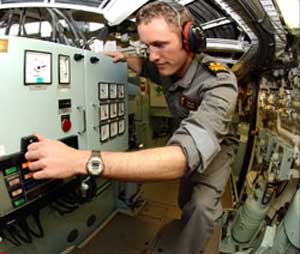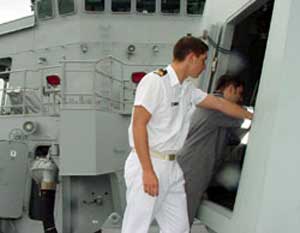Navy Engineering Officer
Tasks & duties

When posted at sea, navy engineering officers may do some or all of the following:
-
manage the operation, maintenance and repair of systems and equipment
-
assess the impact of equipment, systems failures or defects
-
send messages to the naval base requesting assistance or parts
-
in real or simulated combat, advise and make recommendations to the commanding officer
-
manage lower ranks, which includes looking after their welfare, career management, training and personal development
-
manage a budget
-
participate in wartime-scenario training exercises, such as damage-control exercises
Junior navy engineering officers also take a turn staying on board the ship when docked in a foreign port, to act as officer in charge.
When posted onshore, navy engineering officers may do some or all of the following:
-
manage projects for the procurement and installation of new systems or equipment
-
conduct equipment trials
-
repair systems and equipment
-
conduct training
-
complete administrative duties
Specialisations
Navy Weapon Engineering Officer
Navy weapon engineering officers manage the maintenance of:
-
the command and control system, which incorporates radar, sonar and electronic warfare equipment and systems
-
weaponry and weapon systems
-
information and communication systems and equipment
-
navigation systems and equipment.
-
They may also undertake engineering management roles in Auckland, Wellington or overseas where they are working on defence projects
Navy Marine Engineering Officer
Marine engineering officers manage the operation and maintenance of:
- propulsion equipment such as diesel engines, gas turbines and jet engines
- electrical systems on the ship such as power generation, distribution, machinery control and monitoring systems
- mechanical equipment and systems which work the ship's auxiliaries (services required to keep the ship running) such as hydraulic and pneumatic systems, steering gear, refrigeration, air-conditioning and sewerage equipment
Skills & knowledge

Navy engineering officers need to have:
- knowledge of weapons
- knowledge of electrical or marine engineering
- knowledge of naval ship systems and equipment
- knowledge of radio communications
- mechanical and technical skills
- knowledge of Royal NZ Navy regulations and safety procedures
- leadership and decision-making skills
- organisational skills
- good communication skills
Entry requirements
To enter the Royal NZ Navy you must be at least 17 years old and eligible to be a New Zealand citizen. You need to pass a series of psychometric tests and an interview. You must then pass medical and fitness tests and meet an acceptable standard of eyesight and hearing. You also need to be given security clearance, so any criminal convictions you have will be looked at.
Secondary education
To become a navy engineering officer, you need to have NCEA Level 3, including 80 credits over five subjects. You must have a minimum of 14 credits at Level 1 or above in maths, and a minimum of 14 credits at Level 2 or above in English, or School Certificate equivalent.
Tertiary education
Navy engineering officers need to have a Bachelor of Engineering, a Bachelor of Technology or a Diploma in Engineering. This can be gained before or after joining the Royal NZ Navy.
The Royal NZ Navy sponsors suitable candidates through university, or reimburses relevant study already completed. There are various sponsorship schemes available.
If you are being sponsored to study full-time, you will be posted to a ship or shore establishment for on-the-job training during study breaks.
Training on the job
On-the-job training begins with a six-month Junior Officer Common Training Course (JOCT) at the Royal NZ Naval College. This course serves as a general introduction to the Royal NZ Navy and prepares you for general duties as a naval officer.
After completing a relevant tertiary degree, you take a six-month System Engineering Management Course (SEMC) with the Royal Navy at HMS Collingwood in the United Kingdom. The course is recognised as professional development towards registration as a chartered engineer.
You are then posted to a ship as an assistant marine or weapon engineering officer for up to two years. During this time, you study to gain a marine or weapon engineering charge qualification.
Useful experience
A regular fitness programme, involvement in youth organisations or team activities is useful experience.
Related courses
Maritime Engineering
Mechanical Engineering
For more information, please refer to Career Services.
Document Actions
